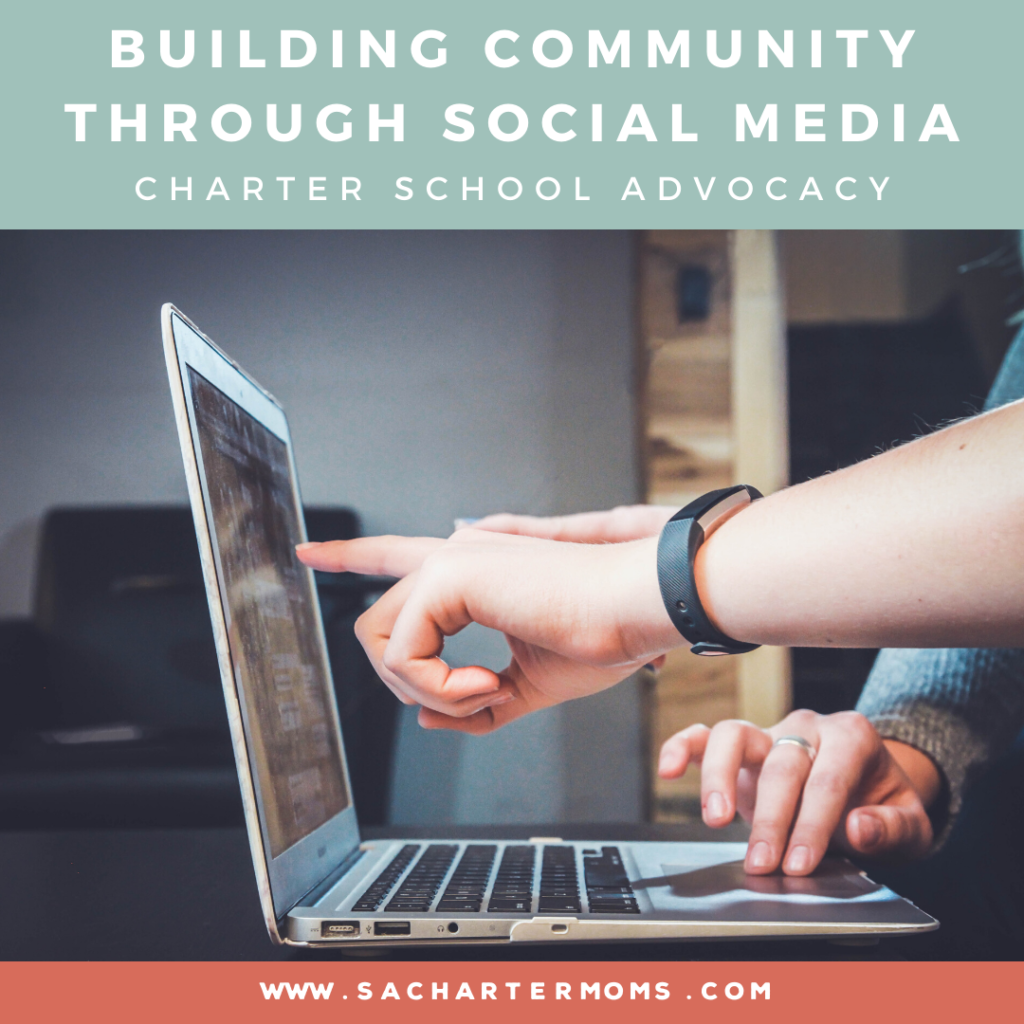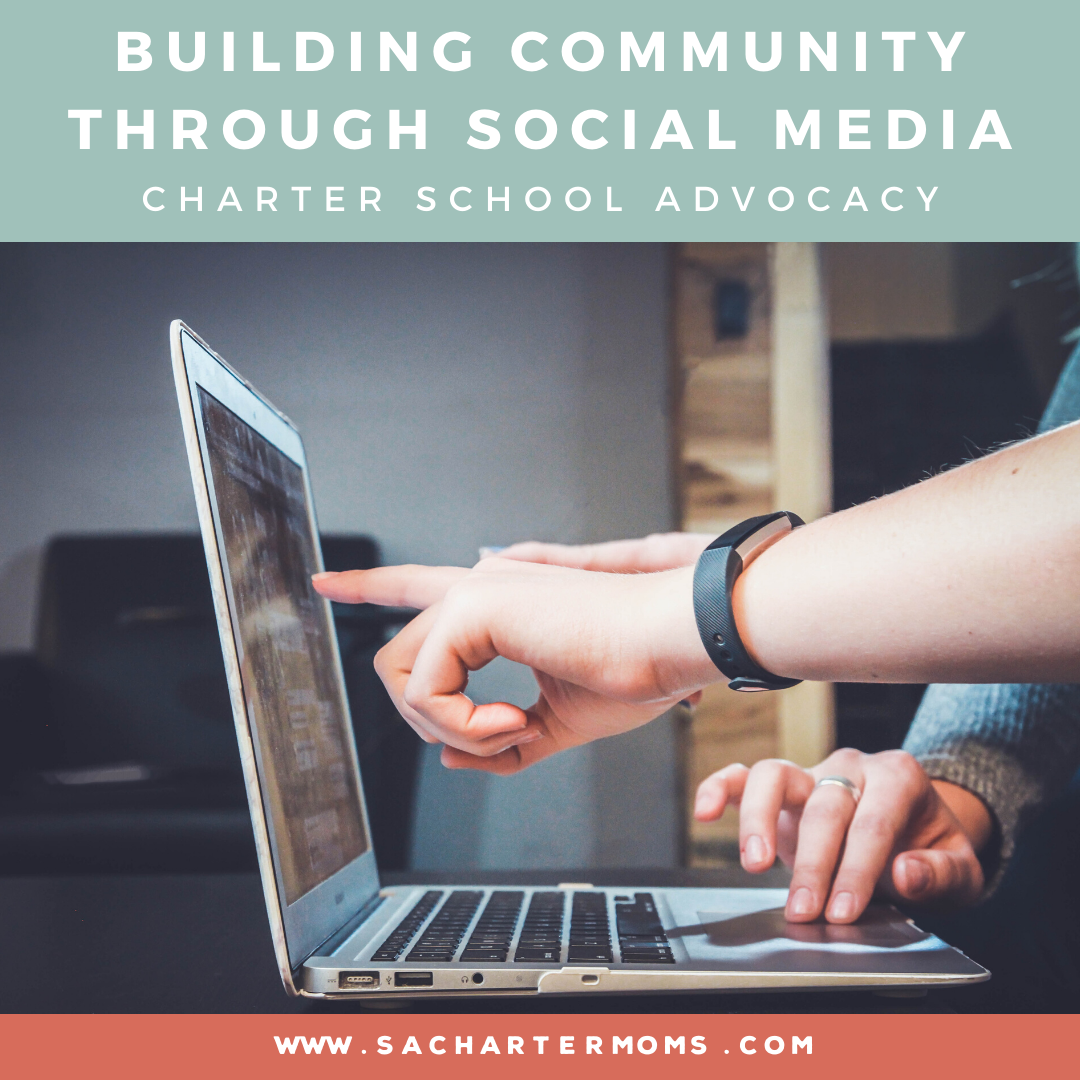
Adapted from a presentation on charter school advocacy by Inga Cotton, Founder & Executive Director of San Antonio Charter Moms, at the Texas Charter Schools Conference on Monday, October 28, 2019.
Families rely on digital platforms to stay in touch with friends and learn about what’s going on in the world. How can your school use social media to build community and train parents and caregivers to be advocates for their children’s schools? Parent activist Inga Cotton, founder and executive director of San Antonio Charter Moms, shares her experiences as a leader and influencer and offer strategies for curating online spaces that support school culture and creating a more favorable policy environment for school choice.
These are the elements of building social media communities for parent advocacy:
- Online communities on social media
- Making change through online activism
- The funnel: from enrollment to charter school advocacy
Online Communities on Social Media
The time we spend online is not a substitute for face-to-face interaction, but may reinforce our relationships with people with whom we share common interests. Charter school families are using social media platforms like Facebook groups to keep in touch and solve logistical problems like carpooling and missing homework. How can these groups be leveraged to build community in ways that are consistent with school culture?
Here are some principles to guide your school in managing online communities.
- Find parent allies to manage the groups. Get to know your most engaged families and find out which ones are social media savvy. Discourage school employees from posting in the groups (but lurking is okay).
- Encourage the group leaders to have written guidelines, for example, forbidding buy-sell-trade posts or partisan politics.
- When group members complain or criticize, moderators should redirect them to communicate directly with teachers or school leaders, or to follow a complaint procedure (e.g., calling a hotline).
- Train your parent volunteers on the privacy rights of students—don’t allow parents to criticize children in the group, even if they are identified by description rather than by name.
- Let the groups be a place for parents to talk about homework, share missing worksheets, etc., as long as the posts are consistent with the school’s honor code or academic integrity policy.
- Welcome families who set up unofficial social events like park playdates. Encourage free or low cost events that will include socioeconomically diverse groups of families.
- Reinforce school culture and mission in the online groups. Share relevant local news, such as stories about the benefits of reading with your kids, and announcements of local events, such as Youth Code Jam or Shakespeare in the Park.
- Allow the groups to be used to gather resources for the school, whether it’s a sign up sheet for pot luck meals for the teachers, additional art supplies for classrooms, or donations to the school’s educational foundation.
Moderating online groups and keeping a positive, civil culture can be a challenge. When it works well, digital groups can build school spirit and connections. Building a school community can be especially hard for charter schools that draw students from a wide geographic area.

Making Change Through Online Activism
Online communities that build connections among families and reflect school culture can also become spaces for informing and mobilizing families as education advocates.
Here are some guidelines for using social media groups as a launchpad for activism.
- Let parent advocate leaders post information, not school employees.
- Keep it strictly non-partisan, and don’t endorse candidates. School communities will include families with diverse political viewpoints across the political spectrum.
- Point families to helpful outside resources, including materials from the Texas Charter Schools Association (TCSA) and the National Alliance for Public Charter Schools. In addition, our site sachartermoms.com has blog posts and explainers.
- Work with parents build their knowledge of civics; for example, learning that the Texas legislature is the main source of funding for charter schools, but that their local city council members are responsible for traffic issues and crosswalks. The federal role in education is more limited than most people realize.
- Encourage parents and caregivers who are more familiar with Facebook and Instagram to learn to use Twitter as an efficient way to reach elected officials and reporters.
- Whenever possible, support parent advocate leaders when they need space and attention to communicate with families about charter school advocacy.
- Encourage participation in wider actions, such as rallies at the state capitol or city council chambers. It’s meaningful when multiple schools come together.
- Partner with organizations like TCSA that offer online tools such as web forms that tailor messages based on family’s home address.
- Be cautious about messages to parents about voting a certain way on a specific bill or proposal; better to direct parents to an outside source with more details.
Online communities can offer a foundation of trust and shared interest that gives families the confidence to speak up in favor of policies that will benefit their children, their teachers, and their schools.
Funnel: From Enrollment to Charter School Advocacy
Building a team of engaged parent advocates starts long before a child’s first day of school. Families are moving through a funnel, starting with their hopes for their children’s brighter future, and continuing as they learn what education options are available to them in their community and how to navigate the enrollment process. That was the topic of our talk later in the conference, Charter Moms Strategy: Boost Student Enrollment with Social Media and Mobile Apps, on Wednesday, October 30 at 8:30 AM. We encourage you to read up on that presentation in this blog post and reach out to us with questions. Many of the same digital communications tools and strategies apply to boosting enrollment and promoting charter school advocacy. The foundation for mobilizing a strong team of parent advocates is bringing families into your school who understand the shared mission and are happy and proud to be there.
Read More
- “Boost School Enrollment Through Social Media,” Inga Cotton, San Antonio Charter Moms, November 5, 2019
- “[Hall Monitor] On Mobile Apps and Equity,” San Antonio Charter Moms, April 27, 2019
- “Charters 101: Being a Charter School Parent Advocate – Founders Schertz Edition,” Inga Cotton, San Antonio Charter Moms, March 5, 2018
- “Notes from the Texas School Choice Week Rally in Austin on January 30, 2015,” Inga Cotton, San Antonio Charter Moms, February 2, 2015
